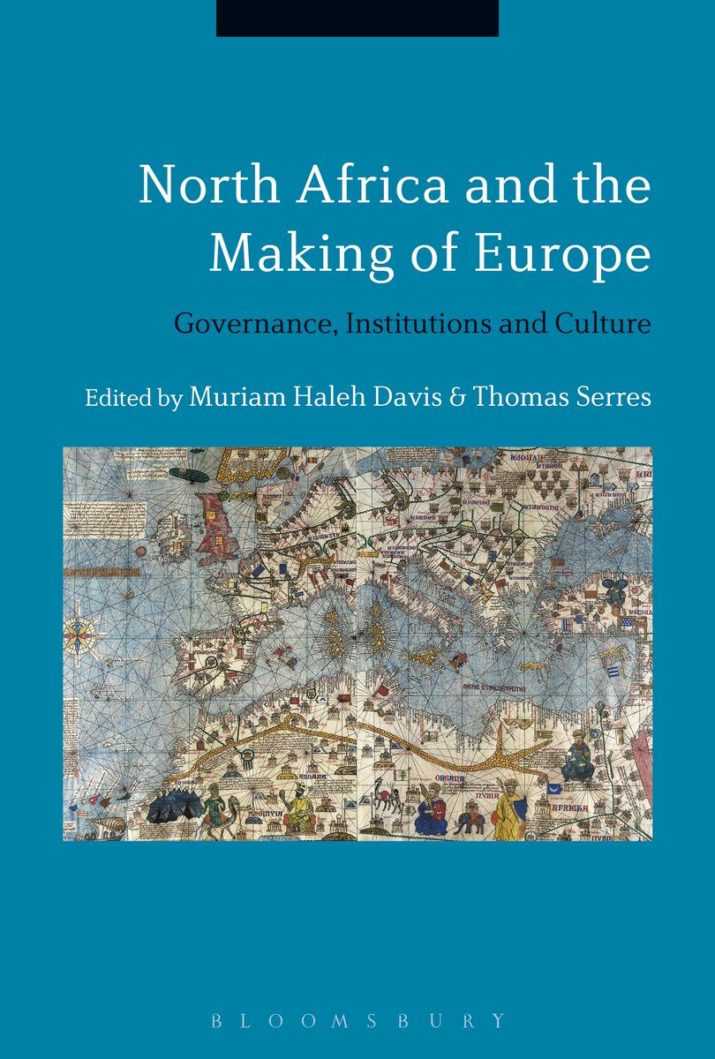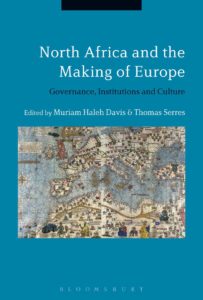
North Africa and the Making of Europe: Governance, Institutions and Culture by Muriam Haleh Davis and Thomas Serres

At a time when nationalist discourse is very much on the rise worldwide, the issue of “European identity” has become pressing and contentious. Threats to the stability of the European Union, along with increasing electoral success of right-wing politicians, are, at least in some part, the consequence of growing mistrust of immigrants and refugees. There is no better time for a text which seeks to illuminate the connections between North Africa and Europe, elucidating how Europeans not only experience North Africa and its people, but also how Europeans have thought about those North African experiences and have used that to define who they are themselves. North Africa and the Making of Europe succeeds in this goal largely because of the multidisciplinary nature of the text, which paints a wide and rich picture of European and North African synergy, thus avoiding essentialism at a time when essentialist critiques are all too common.
The editors, Muriam Haleh Davis and Thomas Serres, open with an analogy that evokes the sentiment that permeates this book: the relationship between North African and European identities should not be imagined as a “boomerang,” but instead as a series of musical chords. These chords include European and North African identities, economic relationships, and religious dialogue—even conflicts over refugees and terrorism. None of these are simply back-and-forths, but are instead a series of known and decipherable relationships that have become natural over time through proximity and regional history. Chords feel natural to us, even as they repeat in new forms, and thus always resonate. In the case of the northern and southern Mediterranean, the conflicts and players might be ever changing, but the authors within the volume demonstrate that various values and relationships become predictable and continue to resonate along colonialist approaches to policy and trade in the region, even in the post-War period.
As the book moves from one case example to the next, a dominant chord becomes the dominant narrative: it does not make sense to discuss European identity in the post-War period without acknowledging that, while not all interactions are neo-colonialist, most are still a product of neo-colonialist European politics and economics. In their own way, each author demonstrates the conflict between proposed core values within the European public imagination and a never-too-distant Occidentialist paternalism. Several core themes permeate North Africa and the Making of Europe, some of which are becoming pressingly relevant to the political changes sweeping several nations along Europe’s southern edge. Discussions of colonialism often focus on those experiencing domination; the authors, under the guidance of Davis and Serres utilize a different lens, one which observes how colonial and post-colonial experiences within North Africa shaped European approaches to foreign and domestic policy. Europe’s reconstruction and the subsequent development of international labor and economic bodies and policies, such as the EU’s Common Agricultural Policy, were all heavily influenced by the lessons learned during the imperial and post-colonial experiences. From several compelling angles, the authors highlight which last gasps of imperialism were deemed valuable enough to be transformed into transnational European policies, with attention paid to the impact of North African culture and identity in shaping these remnants of empire.
Increasingly relevant to Europe’s current struggle with authoritarianism and nationalism, many of the authors delve deeply into the precarious minefield of “European identity.” The editors themselves, and many authors across this book, consciously acknowledge that discussions of European identity as a coherent and monolithic concept are essentialist, and North Africa and the Making of Europe wisely side steps such essentialism by focusing on how their own subjects conceptualize “Europe” or “European identity.” The authors explore how participants in European and North African politics and discourses personally view “European identity” as a coherent self-conception, and how these images are used to shape public policy. This analytical point of view is evocative, as the ties between location, identity, political and economic development, and imaginaries—even hopes and dreams—are relevant for constructing cultural norms at a time when European stability is increasingly in flux.
Unfortunately, the text’s main weakness is the muddying of this lens on European identity. The editors acknowledge the value in engaging in the dialogue surrounding North African influence on European identity from a strong position of the European point of view. This focus on the construction of Europe in the post-WWII period is exciting. But the editors also note that while most of the chapters focus on European imaginaries and experiences, three chapters (6, 7, and 9) are from the North African perspective. This retreat from their clear vantage point blurs the overarching argument of North Africa and the Making of Europe as a coherent piece. This is not to say that these three chapters are lesser or irrelevant—in fact, Souiah, Salzbrunn, and Mastrangelo’s discussion of the mythos of Europe in North African discourses surrounding undocumented migration is a particularly timely chapter across many disciplines. But the editors may have retained a bit more coherence overall had they completely dedicated the text to examining identity formation from within the increasingly troubled European nationalist landscapes that are struggling with cultural dissonance.
Methodologically, then, North Africa and the Making of Europe offers scholars across many social sciences an opportunity to observe the ties between political, economic, and social histories in the region. If scholars are to make meaningful contributions to the public debate over the role of North Africa—and North Africans—in European identity, precisely this kind of interdisciplinary work done is necessary. A major theoretical contribution of this text is the manner by which many authors translate longer-term historical relationships into comprehensive contexts for modern analysis. A serious challenge to the authors was to connect the complex historical relations of the region together with current conflicts in a way relevant to both scholars and policy makers. This challenge is best met toward the end of the collection.
The editors broadly divide North Africa and the Making of Europe into thirds, and it is worth remarking the way the last section brings together the themes of identity, liberalism, nationalism, and post-colonialism to elucidate how recent political upheavals are impacting relations across the Mediterranean. This third section thoughtfully examines the growing discomfort in Europe, particularly in relation to questions of stability, immigration, and terrorism, stemming from the uprisings of 2011-2012 known as the Arab Spring. These authors question the European commitment to human rights or other core liberal values, and demonstrate the tensions European governments experienced while trying to coordinate with a cacophony of North African democratic activist voices and the increasingly chaotic Libyan situation. In the final essay, one of the collection’s strongest, Lilith Mahmud encourages her readers to employ a decolonial critique: a liberal approach that simultaneously acknowledges post- and neo-colonialism while not reducing all power dynamics in the Mediterranean region to a simple “North dominates South” calculus. In doing so, she presents a mindset for approaching many of the current and upcoming conflicts regarding religion, immigration, and political representation that will play a pivotal role in the identity politics of Europe today and to come.
One of the theoretical strengths of this anthology is its willingness to criticize the limits of European liberalism even while constructing arguments regarding the role of idealized liberalism in European identity. Several authors discuss the implications of liberal European states simultaneously preaching human rights protection while ignoring or even supporting authoritarian regimes in North African states. For example, editor Thomas Serres presents a sharp rebuke of the notion that EU interventions during the Algerian Civil War were apolitical; rather, long-term goals of stability allowed exception-making and redefinitions of human rights. Irene Constantini asks her readers to question how European liberalism has reacted to Libya’s revolution and subsequent decay, as “what prevailed after the derailing of the expected transition [to democracy] is an interpretation of Libya as a crisis for Europe and not as a crisis in itself” (234). In other cases, the authors explore how European identities, and the imaginaries they develop within, grow out of and in spite of the anxious liberalism that still struggles to embrace North African economic partnerships in non-neo-colonialist ways.
Overall, while there are several well-argued stand-alone chapters in this text, it is best appreciated as an ensemble piece—a compliment to the editors. Because North Africa and the Making of Europe is so interdisciplinary, even the most seasoned Maghrebi or European specialists will find themselves pleasantly surprised by the wide range of synergies and syncretisms explored in this text, all of which have become inherently accepted as part of European identity. Most importantly, the text’s continuous efforts to reflect a Europe that is not other from North Africa, but is by necessity defined by its proximity and history with the region, is a needed voice in today’s environment of growing authoritarianism and nationalism on both sides of the Mediterranean. The paradigm of action-reaction is replaced with one of complex chords: Davis and Serres’ Europe is made, and remade, by its own understandings of its neo-colonialist and decolonial interactions with North Africa, influenced not only by North Africa, but by its own responses to North Africa both during colonialism and now in the post-War period.
Reviewed by M. Chloe Mulderig, The College of New Jersey
North Africa and the Making of Europe: Governance, Institutions and Culture
By Muriam Haleh Davis and Thomas Serres
Publisher: Bloomsbury
Hardcover / 304 pages / 2018
ISBN: 9781350021839
To read more book reviews click here
Published on February 5, 2019.
Click here for our special feature, Beyond Eurafrica: Encounters in a Globalized World.




